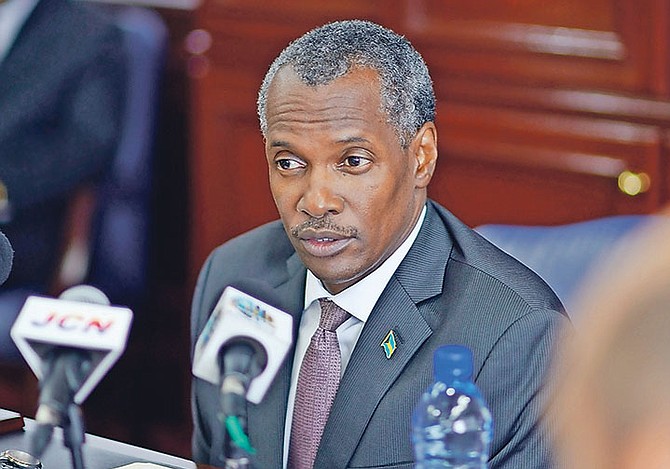By NEIL HARTNELL
Tribune Business Editor
nhartnell@tribunemedia.net
A Cabinet minister says many consumers may not appreciate that Bahamas Power & Light's (BPL) fuel hedging strategy has already produced 30 percent savings on their total energy bill year-over-year.
Desmond Bannister, minister of works, told Tribune Business that households, in particular, needed to strip out the extra consumption produced by current COVID-19 lockdowns and stay-at-home orders to get a true like-for-like comparison between their 2020 electricity bills and the rates they were paying at the same time last year.
Asserting that BPL's move to lock-in the fuel charge at 10.5 cents per kilowatt hour (KWh) until year-end 2021 had produced "almost a 50 percent saving" on that part of a consumer's bill, alone, Mr Bannister said reduced energy costs would help to ease at least some of the economic hardship inflicted on companies and households by the COVID-19 pandemic.
"We've already improved the energy cost tremendously with the hedging exercise that we've gone through," he told this newspaper. "I think there should be almost a 30 percent savings on the fuel charge alone.
"The hedging is a big part of what we're doing, and is certainly something that is going to produce tremendous savings over time. It's going to help everybody to keep up with their bills a lot more than they were before because it is less for them, and less for BPL in terms of their outgoings.
"It's going to help everybody. It's a huge help for everybody, and we're going to get there as a country. It's almost a 50 percent difference on the fuel charge, and 30 percent on the net bill. That's a huge saving. Last year the fuel charge [on consumer bills] was 19 cents per KWh and now it's 10.5 cents per KWh."
Research by Tribune Business, comparing a customer's residential electricity bill for October 2019 with that received for the same month this year, confirmed that the fuel charge had indeed decreased by 30 percent - falling from just over 15 cents per KWh to 10.5 cents per KWH.
This helped to produce a $334 year-over-year saving for that consumer on their total bill, and $252 reduction on the fuel charge, with Mr Bannister reiterating that this would be extremely beneficial for those on fixed earnings or who have lost jobs/incomes due to the COVID-19 pandemic.
"It's a huge savings for Bahamians to keep more money in their pocket," he added. "I think this summer everybody saw the effects. Some people may have measured it by their overall bill but that was a mistake.
"We spent more time at home this summer, used more A/C, used more energy. We wouldn't necessarily appreciate the savings unless we look at the bill, and see how much power we consumed compared to last year, and then see the savings. Factor in the consumption, and it's a huge savings to all of us. When you take that out it's very big."
When BPL's fuel hedging strategy was unveiled in late March, Ministry of Finance officials said it was projected to save hard-pressed consumers and the wider economy some $150m over 18 months.
Both K Peter Turnquest, deputy prime minister, and Marlon Johnson, the Ministry of Finance's acting financial secretary, said then that the move effectively represents a triple win for BPL's household and business customers; the Government and its fiscal position; and the overall economy and the foreign exchange reserves.
The Government and BPL said the $150m total savings would translate into a 30 percent reduction in consumers' electricity bills when compared to the 18-month period prior to August 2020, as the hedge would eliminate for "the first time ever" the cost volatility created by swings in global oil prices.
The aim was to give businesses and households electricity rate certainty at a time when their finances were under huge strain due to the economic crisis created by COVID-19, putting control of energy costs back in consumers' hands.
With rates fixed, and no longer vulnerable to global oil price fluctuations, Bahamian energy costs will be determined by each business and households' management of their consumption.
And, while consumers were to be the main direct beneficiaries, Messrs Turnquest and Johnson said BPL's reduced fuel costs will also help reduce the drain on the $2bn-plus external reserves at a time when The Bahamas needs to preserve every cent of foreign currency it can get given that tourism-related inflows have virtually dried up.
BPL's annual fuel bill is one of the most significant drains on the foreign reserves, which are vital to maintaining the Bahamian dollar's one:one parity with the US dollar. The hedge will thus ease some of the anticipated pressure on external reserves that were initially projected to decline to around $1bn by year-end 2020 as import demand outweigh severely diminished foreign currency inflows.




Comments
Amused 3 years, 6 months ago
Wasn't last month or the month before extremely high for most consumer electricity bills?
tribanon 3 years, 6 months ago
LMAO
Sign in to comment
Or login with:
OpenID